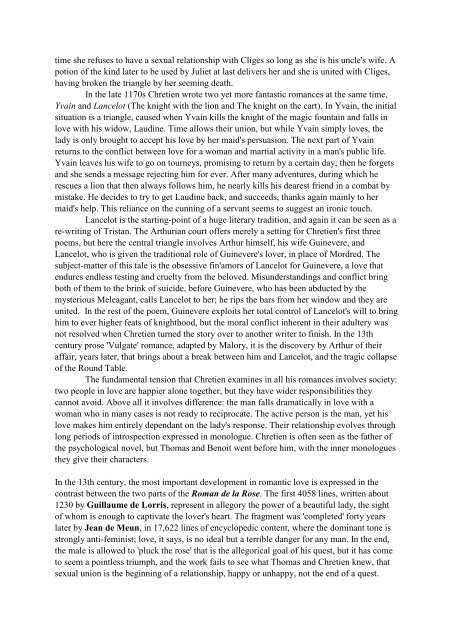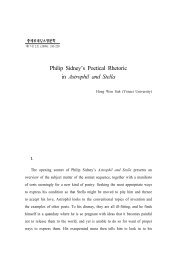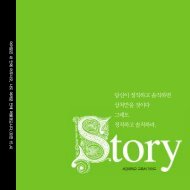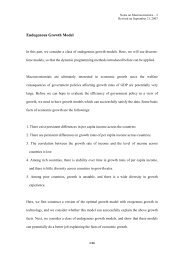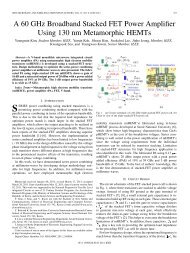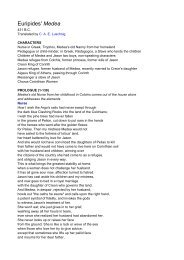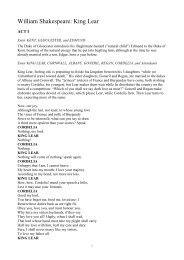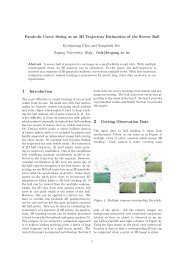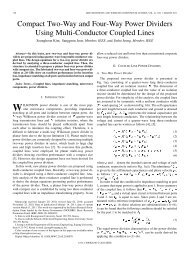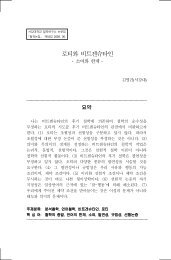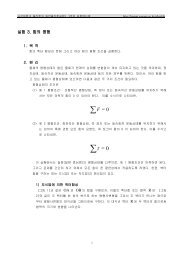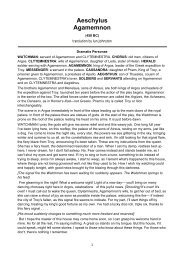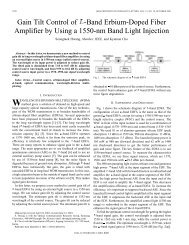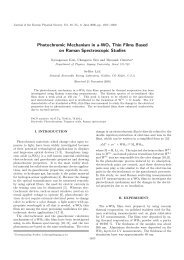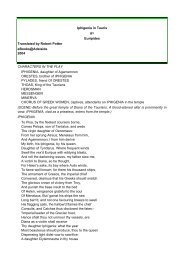Create successful ePaper yourself
Turn your PDF publications into a flip-book with our unique Google optimized e-Paper software.
time she refuses to have a sexual relationship with Cliges so long as she is his uncle's wife. Apotion of the kind later to be used by Juliet at last delivers her and she is united with Cliges,having broken the triangle by her seeming death.In the late 1170s Chretien wrote two yet more fantastic romances at the same time,Yvain and Lancelot (The knight with the lion and The knight on the cart). In Yvain, the initialsituation is a triangle, caused when Yvain kills the knight of the magic fountain and falls inlove with his widow, Laudine. Time allows their union, but while Yvain simply loves, thelady is only brought to accept his love by her maid's persuasion. The next part of Yvainreturns to the conflict between love for a woman and martial activity in a man's public life.Yvain leaves his wife to go on tourneys, promising to return by a certain day; then he forgetsand she sends a message rejecting him for ever. After many adventures, during which herescues a lion that then always follows him, he nearly kills his dearest friend in a combat bymistake. He decides to try to get Laudine back, and succeeds, thanks again mainly to hermaid's help. This reliance on the cunning of a servant seems to suggest an ironic touch.Lancelot is the starting-point of a huge literary tradition, and again it can be seen as are-writing of Tristan. The Arthurian court offers merely a setting for Chretien's first threepoems, but here the central triangle involves Arthur himself, his wife Guinevere, andLancelot, who is given the traditional role of Guinevere's lover, in place of Mordred. Thesubject-matter of this tale is the obsessive fin'amors of Lancelot for Guinevere, a love thatendures endless testing and cruelty from the beloved. Misunderstandings and conflict bringboth of them to the brink of suicide, before Guinevere, who has been abducted by themysterious Meleagant, calls Lancelot to her; he rips the bars from her window and they areunited. In the rest of the poem, Guinevere exploits her total control of Lancelot's will to bringhim to ever higher feats of knighthood, but the moral conflict inherent in their adultery wasnot resolved when Chretien turned the story over to another writer to finish. In the 13thcentury prose 'Vulgate' romance, adapted by Malory, it is the discovery by Arthur of theiraffair, years later, that brings about a break between him and Lancelot, and the tragic collapseof the Round Table.The fundamental tension that Chretien examines in all his romances involves society:two people in love are happier alone together, but they have wider responsibilities theycannot avoid. Above all it involves difference: the man falls dramatically in love with awoman who in many cases is not ready to reciprocate. The active person is the man, yet hislove makes him entirely dependant on the lady's response. Their relationship evolves throughlong periods of introspection expressed in monologue. Chretien is often seen as the father ofthe psychological novel, but Thomas and Benoit went before him, with the inner monologuesthey give their characters.In the 13th century, the most important development in romantic love is expressed in thecontrast between the two parts of the Roman de la Rose. The first 4058 lines, written about1230 by Guillaume de Lorris, represent in allegory the power of a beautiful lady, the sightof whom is enough to captivate the lover's heart. The fragment was 'completed' forty yearslater by Jean de Meun, in 17,622 lines of encyclopedic content, where the dominant tone isstrongly anti-feminist; love, it says, is no ideal but a terrible danger for any man. In the end,the male is allowed to 'pluck the rose' that is the allegorical goal of his quest, but it has cometo seem a pointless triumph, and the work fails to see what Thomas and Chretien knew, thatsexual union is the beginning of a relationship, happy or unhappy, not the end of a quest.


